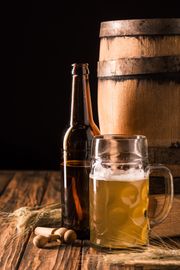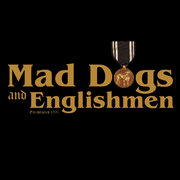
Beer brewing in Britain was established as early as 55 B.C. and has persisted as the staple drink of English culture since. From its beginnings in peasant homes to expansion in thousands of pubs, beer has traveled a long way in terms of availability, flavor, and distribution methods. Here’s a short history of how beer became one of Britain’s most valuable products.
Beer’s Beginnings
Though wheat and barley were grown in Britain before 55 B.C., beer was not documented to exist until Roman soldiers arrived on the land and reported it. Beer became readily known in the Middle Ages when Englishmen and women turned to it as their choice drink. Water couldn’t undergo heavy filtration and purification, and beer was the cleaner and more nutritious alternative. It was brewed in monasteries and abbeys and consumed by all social classes.
Hops & Beer vs. Ale
 Hops were introduced to English beer at the end of the 15th century. Until then, beer was often flavorless or mixed with herbs such as wormwood for taste. This sparked the separation and distinction of brewing methods for beer, as the non-hopped flavor would be characterized as ale instead.
Hops were introduced to English beer at the end of the 15th century. Until then, beer was often flavorless or mixed with herbs such as wormwood for taste. This sparked the separation and distinction of brewing methods for beer, as the non-hopped flavor would be characterized as ale instead.
Beer brewing expanded from small quarters to mass production at inns and taverns. In 1577, a survey of drinking establishments in England recorded 14,202 alehouses, 1,631 inns, and 329 taverns, with one pub for every 187 people.
Commercialization of Beer
Joseph Braham invented the beer engine—a device to manually pump beer from containers in a pub’s basement—in 1797, which quickly became a characteristic element of English breweries and led to the rise of beer and ale distribution. Soon after, the Beerhouse Act of 1830 enabled anyone to brew and sell beer and ale at home or in public houses, upon obtaining a priced license. Hundreds of new pubs opened throughout England as a result.
Expansion of Beer Varieties & Popularity
Stout and porter were introduced into beer classification by the 18th and 19th centuries and are made from roasted malt. Artificial carbonation followed soon after in the 20th century, leading to a rise in bottled beer, with pale ale being the nation’s favorite. The definition of ale changed from non-hooped beer to top-fermented beer, as to differentiate it from the newly formed lager in the 1970s. Today, England is the second-leading European nation in beer production and consumption.
If you’re looking for quality beers that stay true to its English roots, head over to Mad Dogs and Englishmen in Tampa. For over 25 years, this pub has given Floridians a taste of London’s swinging ‘60s by serving up cold draft beers and savory fish and chips. They’re open seven days a week for guests to enjoy the outdoor patio area and live music entertainment. Call (813) 832-3037 for reservations or visit their website to peruse their menu.
About the Business
Have a question? Ask the experts!
Send your question

